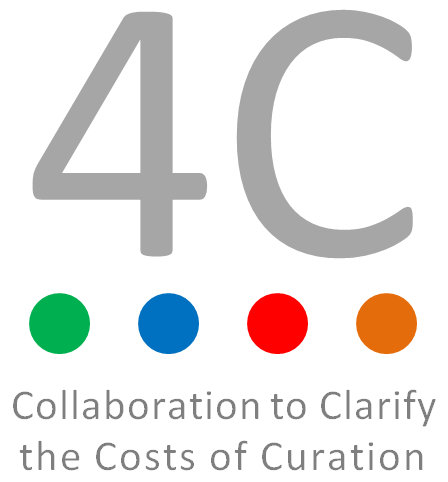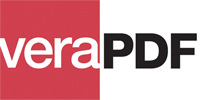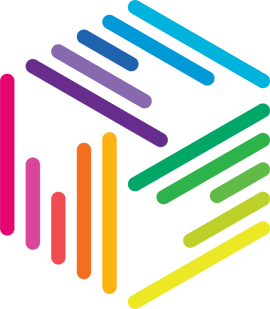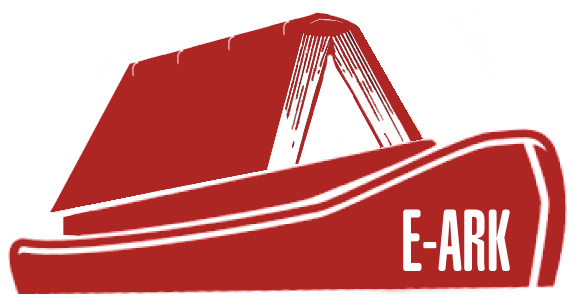Completed projects
4C
 4C - the 'Collaboration to Clarify the Costs of Curation' was aimed at helping organisations across Europe invest more effectively in digital curation and preservation. Research in digital preservation and curation has tended to emphasise the cost and complexity of the task in hand. 4C reminded us that the point of this investment is to realise a benefit. With this in mind the 4C research encompassed related concepts such as ‘risk’, ‘value’, ‘quality’ and ‘sustainability’ leading to the conclusion that organisations that understand this will be more able to effectively control and manage their digital assets over time, but they may also be able to create new cost-effective solutions and services for others. Visit the 4C website for more information.
4C - the 'Collaboration to Clarify the Costs of Curation' was aimed at helping organisations across Europe invest more effectively in digital curation and preservation. Research in digital preservation and curation has tended to emphasise the cost and complexity of the task in hand. 4C reminded us that the point of this investment is to realise a benefit. With this in mind the 4C research encompassed related concepts such as ‘risk’, ‘value’, ‘quality’ and ‘sustainability’ leading to the conclusion that organisations that understand this will be more able to effectively control and manage their digital assets over time, but they may also be able to create new cost-effective solutions and services for others. Visit the 4C website for more information.
Project highlights:
- The 4C Roadmap: an outline of the steps that should be taken in the 5 years leading up to 2020, in order to maximise the efficiency of digital curation.
- Curation Costs Exchange: Understanding and comparing digital preservation costs to support smarter investments.
VeraPDF
 The veraPDF consortium will deliver a definitive validator for PDF/A: an authoritative corpus of test files establishing the objective frame of reference for validation of all parts and conformance levels of PDF/A, an open¬source, and a purpose¬built validator and policy checker to implement the collecting policies of memory institutions. We expect a vibrant community will develop to sustain these efforts.
The veraPDF consortium will deliver a definitive validator for PDF/A: an authoritative corpus of test files establishing the objective frame of reference for validation of all parts and conformance levels of PDF/A, an open¬source, and a purpose¬built validator and policy checker to implement the collecting policies of memory institutions. We expect a vibrant community will develop to sustain these efforts.
The veraPDF consortium brings together a unique network of stakeholders with complementary perspectives from existing collaborative efforts in the PDF industry (through the PDF Association and its association with the respective ISO committees), small and large memory institutions (through the Open Preservation Foundation and Digital Preservation Coalition), and commercial software service providers (Dual Lab and KEEP SOLUTIONS).
Over time, veraPDF will dramatically reduce costs associated with ingesting, quality¬controlling, and managing PDF documents through normalization of the preservation¬ready capabilities of PDF document creating and editing suites worldwide.
‘Preserving Social Media’ and ‘Preserving Transactional Data’
 A study commissioned by the UK Data Service as part of their 'Big Data Network' programme on the preservation concerns of two types of big data: 'Preserving Social Media' and 'Preserving Transactional Data'. Preserving Social Media investigated current methods for capturing and archiving this new and novel form of data within the confines of strict platform Terms of Service and increasing technological demands. Preserving Transactional Data looked at the technical, legal, and ethical complications of capturing, curating, and sharing this rich source of data, defined as data captured in the course of everyday activities online such as filling out a form on a government website or making a loan payment. Recognising the value of large amounts of user-generated data in machine-readable formats, both of these studies provided guidance to overcome the challenges posed by capturing social media and transactional data, derived from platforms and programmes built on quickly changing technologies with frequently updated data policies.
A study commissioned by the UK Data Service as part of their 'Big Data Network' programme on the preservation concerns of two types of big data: 'Preserving Social Media' and 'Preserving Transactional Data'. Preserving Social Media investigated current methods for capturing and archiving this new and novel form of data within the confines of strict platform Terms of Service and increasing technological demands. Preserving Transactional Data looked at the technical, legal, and ethical complications of capturing, curating, and sharing this rich source of data, defined as data captured in the course of everyday activities online such as filling out a form on a government website or making a loan payment. Recognising the value of large amounts of user-generated data in machine-readable formats, both of these studies provided guidance to overcome the challenges posed by capturing social media and transactional data, derived from platforms and programmes built on quickly changing technologies with frequently updated data policies.
Project highlights:
E-Ark
 In co-operation with commercial systems providers, E-ARK will create and pilot a pan-European methodology for electronic document archiving, synthesising existing national and international best practices, which will keep records and databases authentic and usable over time.
In co-operation with commercial systems providers, E-ARK will create and pilot a pan-European methodology for electronic document archiving, synthesising existing national and international best practices, which will keep records and databases authentic and usable over time.
The methodology will be implemented in an open pilot in various national contexts, using existing, near-to-market tools, and services developed by the partners. This will allow memory institutions and their clients (public- and private-sector) to assess, in an operational context, the suitability of those state-of-the-art technologies.
Our objective is to provide a single, scalable, robust approach capable of meeting the needs of diverse organisations, public and private, large and small, and able to support complex data types. E-ARK will demonstrate the potential benefits for public administrations, public agencies, public services, citizens and business by providing simple, efficient access to the workflows for the three main activities of an archive - acquiring, preserving and enabling re-use of information.
- Visit E-ARK services for information governance at the Knowledge Centre
- Visit the E-ARK website for more information
SPRUCE
 SPRUCE (Sustainable PReservation Using Community Engagement) was a collaborative project funded by Jisc and led by the University of Leeds. It offered a series of 'Mash-up' events throughout 2012 and 2013 to put developers and collection owners in touch with each other. DPC supported elements of community engagement in digital preservation and in particular was charged with working up elements of a business case for preservation. Visit the SPRUCE website for more information.
SPRUCE (Sustainable PReservation Using Community Engagement) was a collaborative project funded by Jisc and led by the University of Leeds. It offered a series of 'Mash-up' events throughout 2012 and 2013 to put developers and collection owners in touch with each other. DPC supported elements of community engagement in digital preservation and in particular was charged with working up elements of a business case for preservation. Visit the SPRUCE website for more information.
Project highlights:
- Digital Preservation Requirements and Solutions: A living archive of digital preservation practice that captures the preservation challenges faced by over a 100 practitioners from Libraries, Archives, Museums, Galleries and other organisations.
- COPTR: A registry of digital preservation tools to help practitioners find the software tools they need to solve particular challenges.
- The Digital Preservation Business Case Toolkit: A comprehensive toolkit to help practitioners and middle managers build business cases to fund digital preservation activities.
The Alliance for Permanent Access - PARSE.Insight project
PARSE.Insight was a two-year project co-funded by the European Union under the Seventh Framework Programme. It was concerned with the preservation of digital information in science, from primary data through analysis to the final publications resulting from the research. The problem is how to safeguard this valuable digital material over time, to ensure that it is accessible, usable and understandable in future. The rapid pace of change in information technology threatens media, file formats and software with obsolescence, and changing concepts and terminology also mean that, even if data can be read, it might not be correctly interpreted by future generations.Many initiatives are already under way in this area, and the aim of the PARSE.Insight project is to develop a roadmap and recommendations for developing the e-infrastructure in order to maintain the long-term accessibility and usability of scientific digital information in Europe. The project conducted a number of surveys and in-depth case studies of different scientific disciplines and stakeholders and based its results on these findings, as well as knowledge of ongoing developments.PARSE.Insight is closely linked to the Alliance for Permanent Access to the Records of Science. The output from this project is taken forward in the APARSEN Network of Excellence. Results are also delivered to the European Commission to support them in defining a strategy for developing a sustainable research infrastructure.
Many APA members were also involved in the PARSE.Insight project.
- APA Website: http://www.alliancepermanentaccess.org/
- Project Website: http://www.parse-insight.eu/















































































































































